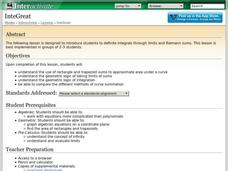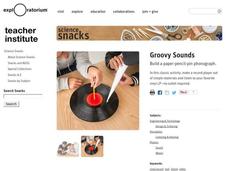Jefferson Lab
Optics: Mirrors and Lenses
Did you see that or did I imagine it? Optical illusions are often created with mirrors and lenses, and here is a presentation that covers many different types of mirrors and lenses and how they work. Flat, concave, and convex mirrors, as...
Teach Engineering
Circuits
Don't know how to make the initial connection on electric circuits? This lesson provides the background to present the introductory vocabulary to learning about electric circuits. It is organized in a meaningful progression with an...
Laboratory for Atmospheric and Space Physics
The Planets and Scale
Scholars gain an insight into the relative size of planets and distance between inner and outer planets with the help of informational text, a data table, and a series of four questions.
Prairie Public Broadcasting
Egyptian Pyramids Virtual Field Trip!
A virtual field trip takes enthusiastic travelers to the pyramids of Giza. Using Google, scholars explore the grounds of the ancient pyramids found in Egypt then complete three worksheets: a photo analysis page, a reflection sheet, and a...
University of Colorado
The Jovian Basketball Hoop
A radio receives radio signals, converts them to an electrical signal, then converts this signal to a sound signal, and amplifies the sound so people can hear it. Class members use this information to create a short-wave radio antenna...
Cornell University
Magnetic Mad Libs
Examine the science behind computer communication. After defining the properties of magnets, learners simulate how a computer hard drive works by sending each other binary codes using the magnets. They use these communications to...
Washington State Coalition Against Domestic Violence
Friends and Family Guide: How to Help Someone in an Abusive Relationship
Ask a question! Listen up! Stay connected! These three strategies are at the heart of a guide that teaches how anyone can safely help someone in an abusive relationship.
Exploratorium
Falling Feather
Whether or not Galileo actually dropped balls from the Leaning Tower of Pisa, this demonstration will solidly demonstrate that objects are accelerated at the same rate, regardless of mass. You will, however, need a vacuum pump and a few...
Shodor Education Foundation
InteGreat
Hands-on investigation of Riemann sums becomes possible without intensive arithmetic gymnastics with this interactive lesson plan. Learners manipulate online graphing tools to develop and test theories about right, left, and...
Royal Geographical Society
An Introduction to Maps
First graders are introduced to a variety of maps such as globes, street maps, atlases, and different types of floor plans. The focus of the lesson requires individuals to create their own plan of the classroom using the PowerPoint...
Prestwick House
Me Before You
Often readers have trouble keeping track of key events in novels. A thorough crossword puzzle refreshes readers' memories regarding key details in the novel Me Before You. Creative clues encourage further review of the text.
SeaWorld
Design a Fish
Craft some neat refrigerator magnets while studying ocean animals with a lesson about the anatomy of a fish. After kids learn about the different parts and shapes of fish, they use modeling compound to design their own fish.
It's About Time
The Rear End Collision
Did you know one in every four car crashes are rear end collisions? The lesson explains what happens to your neck when you are involved in a rear end collision. Scholars experiment and apply Newton's Second Law of Motion.
Curated OER
Zoo-Goers Ready to Greet Baby Panda
The Smithsonian's National Zoo, also known as the Washington Zoo, is one of the oldest zoos in the United States. Youngsters read and discuss a news article about Tai Shan, baby panda that was one of the zoos most famous residents. They...
Swiss Agency for Development and Cooperation
Gender and Sport
Serena Williams, Mia Hamm, and Danica Patrick are living proof that women enjoy sports just as much as men. Sports enthusiasts read about the importance of gender equality on the playing field. They discover barriers to participation and...
American Museum of Natural History
Beyond T. Rex
Some dinosaurs get all the attention. Pupils use an interactive resource to study some of the lesser-known dinosaur species. Organizing the information in a cladogram allows learners to make connections among the species.
Exploratorium
Groovy Sounds
Make music. Class members construct a simple record player using a paper cone and a pin. The resource provides a description of what is happening and why listeners can hear the sounds through the cone.
Code.org
Practice PT - Design a Digital Scene
The final performance task for the unit requires class members to utilize what they have learned to create a personal digital scene. Groups work together to develop a scene and then, using top-down design, break the scene into...
Kenan Fellows
What Is Heat?
If objects have no heat, how do they can gain and lose it? Scholars experiment with heat, temperature, and specific heat of various substances. They create definitions for these terms based on their own conclusions to complete the fourth...
PBS
Code Creators
The lesson is real—even if the computer code isn't. Scholars learn about pseudocode, which simulates computer code using everyday language. They write pseudocode for simple actions, then have classmates guess the action from the written...
Michigan State University
Gases Matter
Young scientists learn that seeing isn't necessarily believing when it comes to the states of matter. After performing a fun class demonstration that models the difference between solids, liquids, and gases, children complete a series of...
Colorado State University
Why Do Hurricanes Go Counterclockwise in the Northern Hemisphere?
Test your class' coordination as they model the Coriolis Effect. Forming a large circle, learners move to the right as they try to toss a ball to the person across from them. The movement of the circle represents the rotation of the...
DiscoverE
Build a Big Wheel
Pasta is great for cooking—and for making Ferris wheels. Aspiring engineers use an assortment of pasta types to create a functioning Ferris wheel. They keep track of the design process to refine their designs, if necessary. Let's hope no...
NOAA
History's Thermometers
How is sea coral like a thermometer? Part three of a six-part series from NOAA describes how oceanographers can use coral growth to estimate water temperature over time. Life science pupils manipulate data to determine the age of corals...

























